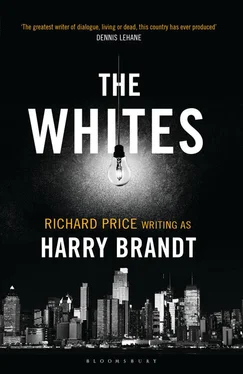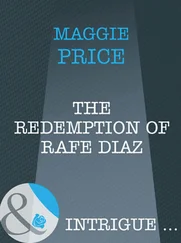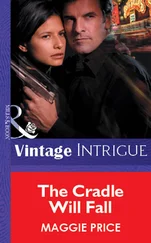“So what else was going on back then?” he asked.
“What else? You don’t know your history? You don’t know about Checkpoint Charlie?”
“I heard of it.”
“You don’t know nothing about the tank standoff with the Russians? I was a machine gunner, they had me set up outside the hatch of a M-48 staring right into the cannon of a T-55 for sixteen motherfuckin’ hours, couldn’t have been more than seventy-five yards away. I swear, as scared as I was? If I hadn’t been so drunk, we’d of had World War Three right then and there.”
Returning to the park to pick up a copy of the Crime Scene Unit report, Billy noticed that the small trucks from upstate and New Jersey had begun to arrive for the Union Square Greenmarket, the vaguely hippieish farmers dragging out their folding tables and canopies in the predawn dark. He also saw one of his supplementals, Milton Ramos from Dennis Doyle’s squad in the 4–6, standing on the edge of the scene watching the techs stow their gear.
Billy had been trying to keep his distance from the guy all tour; like a number of one-offs, there was something not quite right about him. He seemed to be both on edge and spacey, plus Billy was pretty sure that he’d been slipping off fairly steadily to drink. Not that Ramos would have been the first detective on Night Watch to sweeten the long hours and boredom that way; Feeley’s eyes often looked like two cherries floating in buttermilk, but that was Feeley.
The CSUs, both female, were hunched over the hood of their van now, sorting through their report forms.
“So how was the great tuna robbery,” Billy asked Ramos. “Anything fishy about it?”
“I think it was an inside job,” Ramos said flatly.
He was short and thick but too powerfully built to be called fat, his slitted features hidden beneath thick brows and a permanently impassive expression. Billy had him pegged as a complete loner, on the job and off, the type of uncommunicative humorless near blank that made everyone in his home squad uncomfortable.
“You know,” Ramos said, looking around the park, “I used to work midnights my first two years, but now? I don’t know if I could handle it anymore. How does your wife put up with it?”
“She’s a nurse,” Billy said, “she can put up with anything short of me having a second family.”
“Oh yeah? What kind of nurse?”
“ER, but over the years she’s done it all.”
“Done it all, seen it all… Easygoing?”
Billy gave him a look. “Philosophical about things,” he lied.
“Philosophical.” Ramos nodded, still looking away. “Shit happens.”
“Something like that.”
Billy saw Stupak, coming from the Irving Place homicide, enter the park and head toward the tents and tables, waiting for someone to open up.
He raised his cell to call her.
“She always want to be a nurse?” Ramos asked.
“What?”
“Your wife.”
“What is this, an interview?”
“No, I’m sorry, I just… My wife? She passed seven years ago.”
“I’m sorry to hear that,” Billy said, killing the call.
“Yeah. Hit-and-run.”
“I’m sorry.”
“We have a daughter, she’s eight,” he said, then: “If the mother’s dead and you say ‘we,’ is it ‘We have a daughter’ or ‘We had a daughter’?”
The guy was definitely sauced, but he was talking about losing his wife.
“Grammar wasn’t my strong suit,” Billy said.
“You have kids?”
“Two boys.”
“Two boys, double the trouble.”
Billy impatiently checked the time, six-fifteen in the a.m., the crime scene techs still hunched over the hood working up their reports.
“Back when we were kids?” Ramos moved closer to him. “Me and my brother, we were the terror of the neighborhood.”
“Oh yeah?” Billy tried to call Stupak again. “What neighborhood was that?”
Ramos either didn’t hear him or didn’t want to answer.
“What are you doing,” Billy asked Stupak.
“Where are you?”
“By the Gandhi statue waiting on CSU. Bring me a coffee, cream and sugar, and a buttered roll.”
“You know,” Ramos plowed on, “before she died, my wife was an X-ray technician at Beth Abraham for five years, so I know a little about nurses. And, the little I know is that they’re not like cops, you know what I’m saying? You don’t become a nurse because your mother and grandmother were nurses, so forgive me for getting personal and you can just tell me to mind my own business, but I’m curious, why do you think your wife became a nurse?”
“Now I’m supposed to say, ‘Because she likes to help people’?”
“Not at all, I was just wondering if there was any one moment where she, you know, like an event or something…”
Billy gave him another long look.
“Like with me,” Ramos said quickly, “I never thought I was going to be a cop, I was a troubled kid, a fighter. But when I was seventeen, I lost my mother and two brothers all like within a month’s time, and I needed a place to hide.”
“What do you mean, hide.”
“Not hide, more like I needed a structure, you know, be part of something that would give me all the dos and don’ts, keep me from going over to the dark side. It took a few years, but here I am.”
“Here you are,” Billy said, not liking this guy at all, him and his copious tragedies.
One of the techs finally came over, peeled off a copy of the report for Billy, then headed off to the greenmarket with her partner.
“Beautiful, right?” Ramos said, as the sun began to paint the tops of the ancient office buildings at the western edge of the square.
Billy loathed sunrises; he knew them as cruel mirages, each one a false promise that a tour had come to its end when, in fact, depending on the time of year, there were anywhere from one to three hours left for that phone to ring with a fresh disaster. Sunrises, like Ramos here, made him tense.
They made him feel fucked with.
“Listen to me,” Billy said abruptly. “You’ve had liquor on your breath all night.”
Frowning, Ramos looked away.
“I’m not going to write you up, but I don’t ever want to see you on my tour again. In fact, you can take off right now, I’ll sign you out when I get back to the office.”
At first, Ramos didn’t respond, his frown deepening into a scowl, but then he began nodding his head as if having come to some kind of decision.
“I apologize,” he said quietly, turning back to Billy and handing over the keys to the squad sedan, “and I appreciate the courtesy.”
Ramos walked off toward the Fourteenth Street subway entrance without another word, Billy watching him all the way, wondering if he had been too hard on the guy.
Then, tired of waiting for Stupak to deliver his breakfast, he wandered over to the market himself, where he discovered that almost all the cops involved in the three wee-hour local felonies were now cruising the food stalls as intensely as if they were at a gun show.
Walking into the house with two biodegradable bags filled with agave-sweetened muffins, crullers, and doughnut holes, it seemed to Billy that the only one up and about was the six-year-old, Carlos sitting in the dining room and eating the breakfast he had made for himself: a teacup of orange juice and an unthawed Eggo.
“Where’s your mother?” Billy asked, dropping the waffle into the toaster. “Is she still sleeping?”
“I don’t know.”
“Where’s your brother?”
“At Theo’s house. He slept there on a sleepover.”
Through the kitchen window Billy saw his father sitting on a lawn chair beneath one of the TARU cameras in the backyard, the old guy, as usual, reading the New York Times .
Читать дальше












